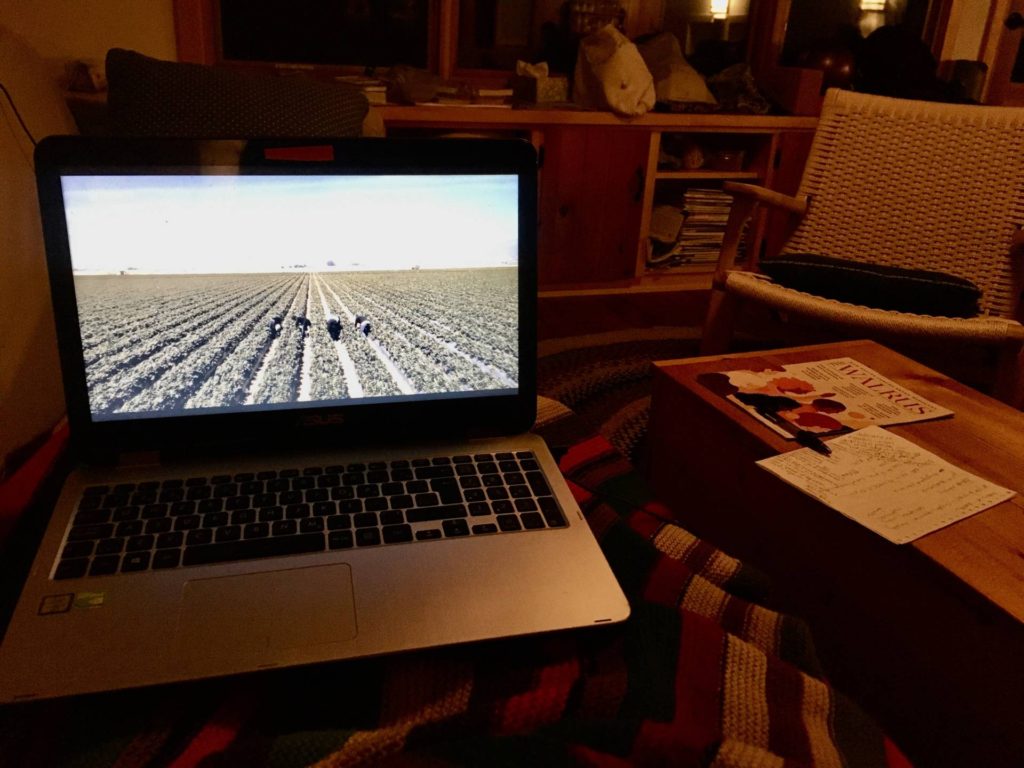
Nora Cole is Atkinson’s Manager of Policy and Communications and a documentary film nerd. The above photo captures her HotDocs 2021 experience – under a blanket, on her couch.
Every April, I hum to myself “it’s the most wonderful time of the year.” No, I don’t have my dates mixed up and think it is Christmas. What I’m celebrating every April is the Hot Docs Canadian International Film Festival.
I started attending the festival with my parents when I was in high school, spurred by my love of photography, film, and documentary class electives (shout out to my teacher, Alison Mann). Since then, it’s become an annual event. We’ve seen hundreds of films from all around the world, many cherished favourites. Each year usually begins with each of us reviewing the program book, circling everything we want to see. Then we see what overlaps and plot the schedule, sometimes fitting in two or three documentaries in one day. The festival itself is a blur of eating dinners in line, grabbing coffees before a late night screening, lots of laughs, tears, reflection, and action.
Some years, we accidentally end up with themes that made for important conversations: 2006 was experiences of photojournalists in conflict zones; 2011 was a lot of stories of sports; 2019 was only happy films.
So while our way of watching is different this year (on my laptop, by myself), my list this year is heavily tilted to documentaries about all different kinds of work – in the gig economy, agricultural fields and factories, movements and institutions for justice, restaurants, and even the Legislative Assembly of Ontario. A 2021 theme has emerged.
The festival curators smartly paired some films with engaging conversations to dig deeper into what they reveal. My colleague Ausma Malik is in conversation with the Toronto Star‘s Sara Mojtehedzadeh and Gig Workers United‘s Jennifer Scott about the film The Gig is Up, unpacking the gig economy – and the hustle between making a living and having a life. It was the kind of post-film coffee shop chat I miss and was glad to have. You can check it out here.
Here is what I am taking away about work today from my HotDocs queue so far:
Work is central to our lives
In the current capitalist system, working is a huge part of how we support ourselves, our families, and communities – for better and for worse.
And still, in many different kinds of work, many people find enjoyment and take pride in it. Masamoto Ueza in Come Back Anytime expresses great care and joy in creating recipes, picking ingredients, and creating community in his ramen restaurant. In The Gig Is Up, Layla Ouadad, a Deliveroo and UberEats bike courier in France, talks about how she loves the feeling of being on her bike even as she fights for safety for couriers, better working conditions, and higher wages.
“I want our job to be seen, dammit”
Layla, and the other gig workers from around the world featured in The Gig Is Up, are also fighting for visibility.
My parents and I queued up to watch it at the same time (from our respective living rooms) and chatted on the phone after watching it. They expressed surprise about how deep the gig economy went. While they’d heard of Uber and knew about the conditions for their workers, the work of MTurk workers was new and immediately prompted outrage that many of them are paid in Amazon gift cards.
In Fruits of Labor, Ashley Solis listens in her high school class about the exclusion of agricultural and domestic work from protections in the New Deal in the United States, as she goes to work in an agricultural processing plant overnight. She reflects on the history of the United Farm Workers and how so many things still need to be better – especially as she stresses about her mother’s work, as an undocumented immigrant.
Visibility matters: in recognition from bosses, the public, and consumers; and in the eyes of the labour laws, standards, and regulations. All workers should be valued, and have their work fairly compensated and protected.
In Body Politics, MPP Jill Andrew also touches on another important aspect of visibility. She speaks about trying to move issues forward in the Ontario Legislative Assembly and how she’s faced insults from opposing politicians. She shares her hope that other people who are queer, Black, fat, and women will see her fighting and know they can too be “in the house.”
We can only change work if we do it together
Organizing and collective action for better conditions are the features of several of these documentaries: reforming a local justice system (Philly D.A.); getting a safe railway crossing for kids (Militant Mother); addressing the labour, environment, road safety, and public infrastructure issues of ride hailing services (Ride Fair). And of course, in The Gig is Up, witnessing Uber and Lyft drivers in California come together, lobby for better legislation, call on companies and the government for better work practices, and get justice for injured workers.
There are lots of issues that need to change about work. So as I continue to tune in, I’m following the organizers who are leading the way in improving the ways we work: Justice for Workers – Decent Work for All, Gig Workers United, and Migrant Workers’ Alliance for Change to name a few.
If you need some more recommendations check out my annual Hot Docs thread and Just Work It’s fave films about work, crowd-sourced on Instagram (including the incredible doc A Woman’s Work by Yu Gu, from 2019 Hot Docs!). Then, get in touch – I’d love to hear what you are watching and what it is making you think about work.
